Next Time You Drop Your Phone In The Toilet, Tell Yourself You're Charging It
“Human urine has been used to charge a mobile phone in a major breakthrough for researchers. Just half a litre of waste generated enough power to make a six-minute phone call and to send several text messages.”
The Best Way To Deal With Benefits (Pay, Don't Go)
Today’s podcast is sponsored by Audible. From this link right here you may obtain a 30-day free trial of Audible and a free audiobook of your choosing. Books: they prevent you from thinking about the heat.
Things! Matt Bell at McNally Jackson; Susan Choi’s book party at PowerHouse Arena; OMD at Terminal 5! Plus a benefit for the Ali Forney Center. I give you a pro tip on how to deal with benefits. It’s a good one.
OH ALSO everyone is reading from David Rakoff’s novel at B&N; Union Square tonight. “Everyone” means a bunch of people.
Greetings From Asbury Park, N.J.

As I walked through Ocean Grove, a small town just south of Asbury Park on the Jersey Shore, I felt proud of my people. Who else but my fellow childless, non-heterosexual disciples of the past would have had the patience and fortitude to sweep uninvited into this enclave of once-dilapidated Victorian masterpieces, and — undeterred by the proximity to 1) the post-war urban blight of Asbury Park and 2) the religious blight of the Methodist Church, which founded Ocean Grove in 1869 as a “camp revival” site and still owns the land on which every house sits — painstakingly refurbish every spoke and shingle? I imagined what it would be like to live in a house where the jagged edges of my obsessive nature could be soothed by daily contemplation of kaleidoscopic color schemes and ornate detail.
You don’t have to belong to the church to buy in Ocean Grove, you just have to sign a 99-year renewable lease from the Ocean Grove Camp Meeting Association, whose slogan is “God’s Square Mile at the Jersey Shore.” Still, architectural bliss aside, I doubted that I could ever live here; to be subjected to the rule of homophobic Jesus freaks would be like a return to the United States circa 2012. I might even feel compelled to hang from my porch a flag emblazoned with the HRC logo or — most dispiriting of all — a rainbow.
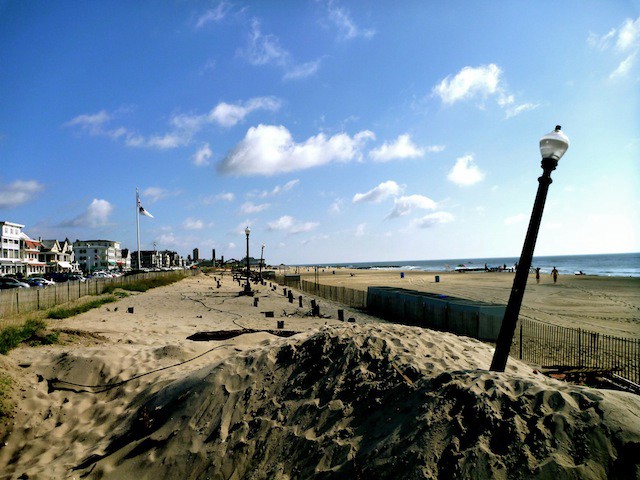
I soon arrived at the beach, where a big stretch of the Ocean Grove boardwalk had been swept away by Hurricane Sandy. As I considered a recent ruling by FEMA to deny the Camp Meeting Association — designated a “private entity” in this context — the necessary funds to rebuild, I gave in to a sense of schadenfreude as I thought about the same association denying a gay couple the opportunity to perform a civil union ceremony on the boardwalk in 2007. Assessing the situation objectively, it seemed probable that God was expressing his displeasure at such discriminatory practices.
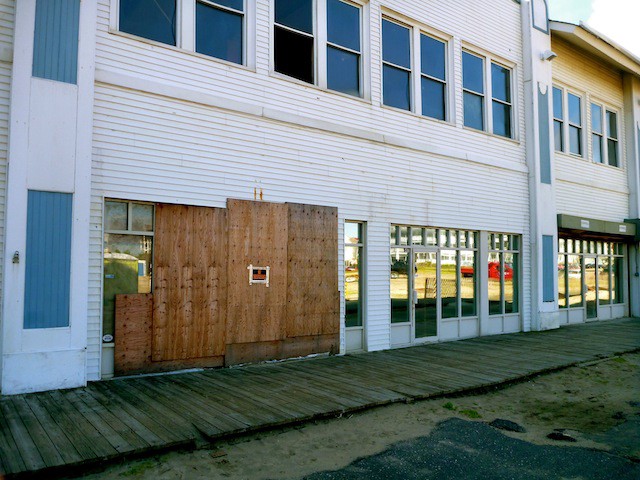
Heading north, I felt less smug as I considered the shuttered businesses closer to the ocean. Hardly a day passes when I — like 97 percent of MTA-commuting New York City office workers — don’t fantasize about moving to a beach town and opening a small business, and here was the result of those dreams.
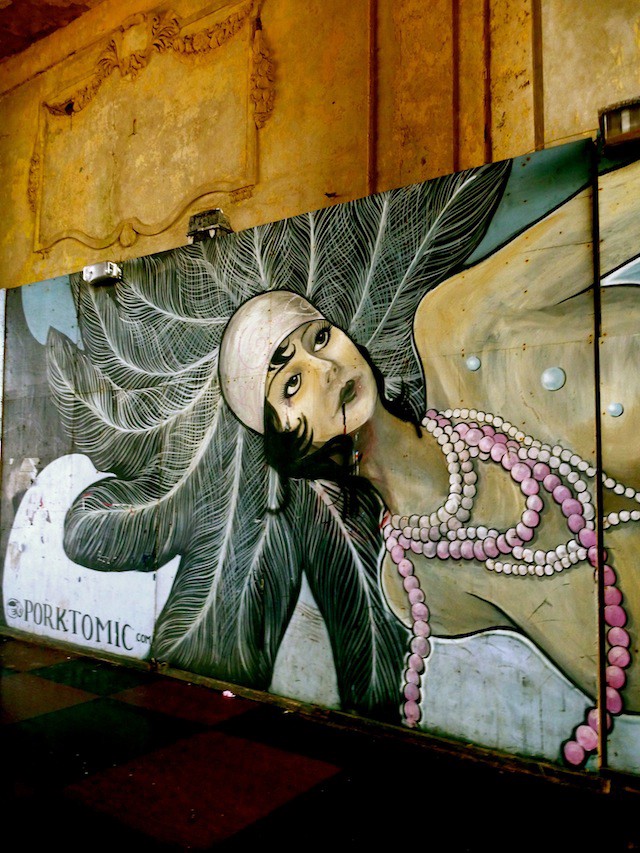
Fortunately, the famous ruins of Asbury Park — the great, fallen resort — seemed to have made it through the storm unscathed. Some of the murals I remembered were gone, but the flapper mermaid had been spared. Or it was possible, I reconsidered, that she was a recent addition, which seemed plausible and appropriate (at least when it comes to artwork), sort of how a forest fire will burn away the old growth to make way for the new.
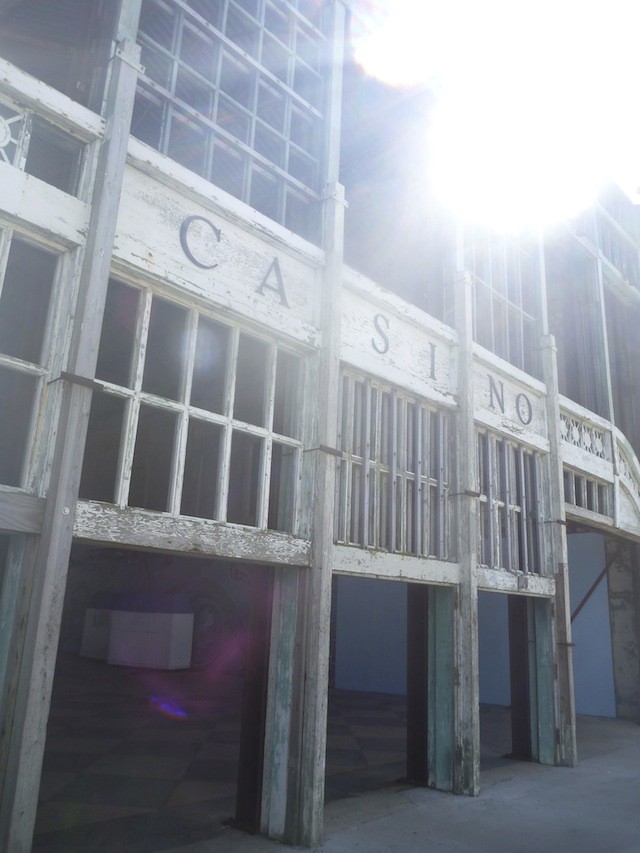
As so often happens when I leave New York City, I was astounded that a developer hadn’t yet bought this land and converted it into luxury condominiums, or at least (with the usual bribes and kickbacks) persuaded the city to build a refurbished “green space along the waterfront” to entice moneyed prospects to open their wallets. I had spoken to several residents who told me that the legacy of Hurricane Sandy will be to push the working class away from the coastline so that the Jersey Shore will increasingly become a “playground for the rich.”
It was difficult to argue the point. Having lived in New York City for the past twenty-five years, I had witnessed the similar, ongoing, and tragic effects of “Superstorm Capitalism.”
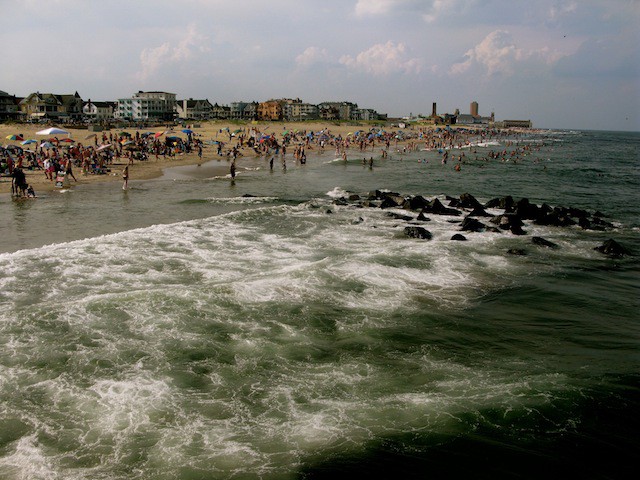
At least the water was crowded enough with swimmers to believe that the beach still belonged to all of us, notwithstanding the best efforts of rich people everywhere to limit access.
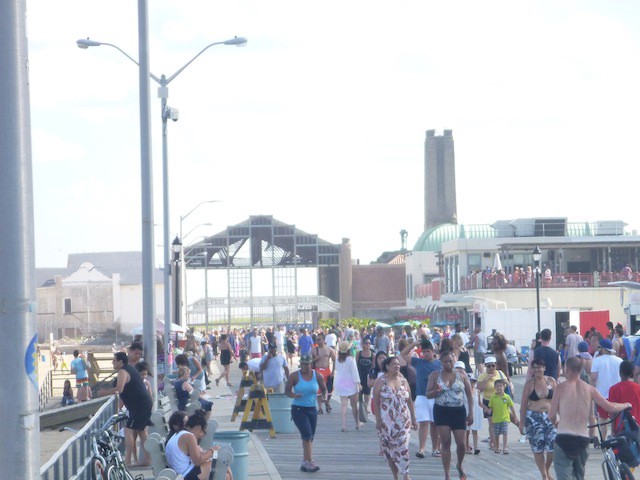
Similarly, the Asbury Park boardwalk was packed and — in another definite sign I wasn’t in New York City — everyone seemed to be in a good mood. I immediately vowed to move at the earliest possible opportunity to Asbury Park, where I would open up a palm-reading shack and play drums in an old-school punk band at the Asbury Lanes. I felt my earlier pessimism ebb away with the tide.
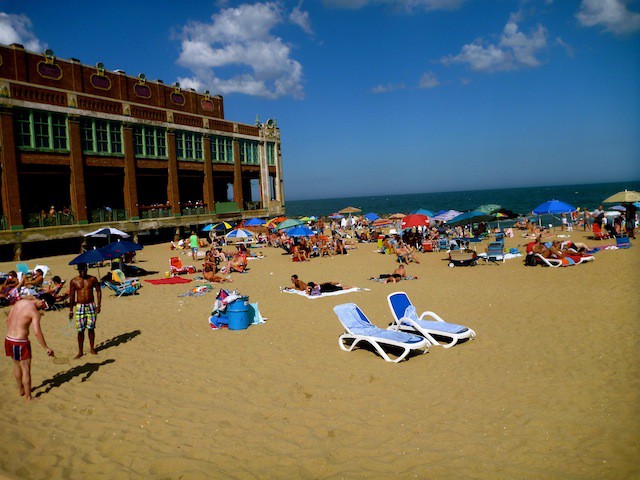
I made my way through the crowds to the non-heterosexual section of the beach, where I admired the hot gay bears and watched two young men play a game of badminton without a net. Thankfully, neither church nor gated community had jurisdiction over this magical, ruined landscape, or you can be sure that all such behavior would have been proscribed.
Matthew Gallaway is the author of The Metropolis Case.
New York City, July 15, 2013

★★★★ Dirty water flowed in the gutter, getting cleaner on the approach to its headwaters, a man hosing down the sidewalk. Six or eight identically tanned legs crossed the street in a group. A furniture delivery crew and apartment doormen still wore long trousers, but everywhere else was surrender, or license passing as surrender. Up Lafayette came another pair of legs, elderly ones, newly exposed in their ivory pallor, perfectly matching their white canvas sneakers. Enter real, hot summer, something to complain about, to plead helpless and naked exigency before. A deliveryman could wash his vest in the water feature outside the apartment building’s doors. The rot and fatigue had not had time to set in yet; here were Hell’s blazes without Hell’s eternity — a poem for the Hell-tourist. To be honest, it was still fine in the shade. Even the sun was agreeable, for a while, after the air conditioning. It could be worse, and it would be worse, and that was kind of exciting.
Pig Panics Prague Pedestrians
“For two hours on Sunday, a wild boar terrorized pedestrians and police alike in Prague, Czech Republic.” Yeah there’s video.
Men Wear Pants Because That's What Men Do
Why do men wear shorts? If you answered, “Because they are unwilling to admit that they are men and they are unprepared to accept that so being carries with it certain responsibilities one cannot shirk just because it might feel a little unpleasant outside,” you are correct. There’s also a historical explanation.
Chopped Salads: What Are They About?

• “It’s about control, especially for millennials. They want the ability to customize and control what’s happening to the food that’s being prepared. They want it the way they want it.”
• “It’s about flavor distribution. If you order a deli tossed salad you put dressing on it and the dressing distributes over 50 percent of it, and you end up stabbing a cherry tomato.”
• “It’s nice because it’s something you can’t do at home. You’d have to buy so many ingredients it’s just not possible.”
— “The ceaseless chop of the curved two-handled blade known as a mezzaluna provides the background music for lunch in Manhattan these days.” And how!
Manhattan Inside The Grand Canyon, But Not In A Sexual Way Or Anything
Have you ever wondered what Manhattan would look like inside the Grand Canyon? Of course you have. EVERYONE DOES. Stop anyone at random on the street and ask them what they are thinking about at that particular moment and they will look down at their feet and sheepishly admit that they were wondering what Manhattan would look like inside the Grand Canyon. It is said that if you were able to float through the dreams that trouble New Yorkers’ fitful slumber each night you would spend most of your time suspended in the air above a Manhattan dropped within the vast confines of the Grand Canyon. In fact, I can say to you with a good deal of confidence that only seconds before you started reading this link you were musing to yourself about how the Grand Canyon would appear if Manhattan were inside it, and if you tell me that you weren’t we both know that you’re a goddamn liar. Anyway, instead of wondering, why not take a look at these amazing images [which] show Manhattan inside of the Grand Canyon. It’s exactly how you pictured it, right?
'Sex Lube' Would Be A Good Name For A Band
“Two post office workers were taken ill after a chemical spill — which embarrassingly turned out only to be sex lube.”
Eldridge Cleaver's Emo Diary
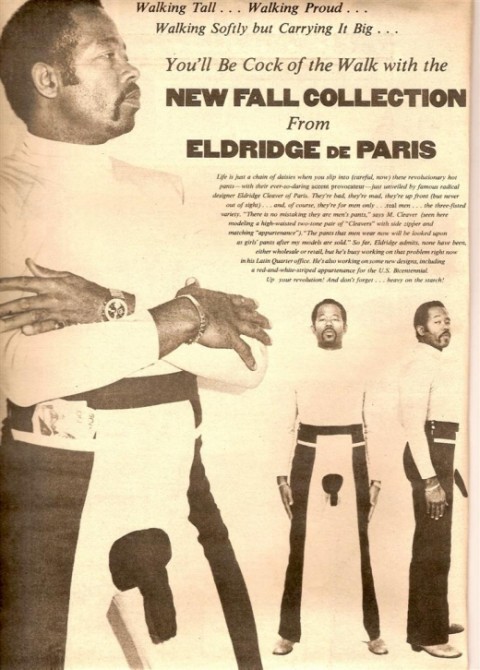
Hello, would you like to buy something weird? Hammer Time is our guide to things that are for sale at auction: fantastic, consequential and freakishly grotesque archival treasures that appear in public for just a brief moment, most likely never to be seen again.
Two days after Martin Luther King, Jr. was assassinated in Memphis, community leaders urged the nation to honor the pacifist leader with nonviolent gatherings. But among the vigils and demonstrations, riots also erupted in over 100 cities, although not in New York.
In Oakland, 15 members of the Black Panther Party parked their cars on Union Street, just a few blocks from where their leader had shot a police officer, and waited to be noticed. According to the Oakland Tribune, a patrol car soon pulled over to question them. The policeman riding in the passenger seat emerged first, and he was met with bullet. A shotgun shell grazed the driver, and 49 more bullets littered the cruiser.
“I will tell anyone that that was the first experience of freedom that I had,” Eldridge Cleaver, who was the group’s Minister of Information, told Henry Louis Gates, Jr. in a 1997 interview.
Backup was called, and the group disbanded. Cleaver and Bobby Hutton, the party’s first recruit, were among the eight men who sought refuge in a nearby house on 28th Street. Residents narrowly escaped as police arrived; a 90-minute gun battle ensued. The Oakland police launched round after round of tear gas through windows, and soon the house was in flames.
The fire forced them out, but what happened next is still debated. According to the police, Hutton emerged in a coat and was unresponsive to calls demanding he halt. Cleaver and eyewitnesses contend that Hutton not only halted, but responded to policemen’s suspicions that he was armed by stripping down to his underwear. Lieutenant Hilliard would later say that Hutton was handcuffed.
They just took Bobby and pushed him. They pushed him, and he only went about five feet. He was stumbling and almost falling. They shot him 12 times. Murdered him right on the spot. He fell down.
Hutton was 15 days shy of his 18th birthday. The Blank Panther Party’s first recruit was buried three days after Dr. King, six days after the shooting. By then, Cleaver was in jail, but more than 2,000 people attended Hutton’s funeral at the Ephesians Church of God in Christ in Berkeley. Marlon Brando and James Baldwin were there. Gloria Steinem, Lawrence Ferlinghetti, Terry Southern, Norman Mailer, Susan Sontag and many others signed a letter about Hutton’s death to the New York Review of Books. At the time, The Black Panther Party asserted they had not planned the attack; Cleaver later said it was an ambush.

After the shooting, Cleaver faced up to 82 years in prison for violating parole. He spent his youth in and out of detention centers for petty crimes and a drug felony at the age of 18, but in 1958 he was convicted of rape and intent to murder. While in prison, he wrote Soul on Ice, an influential and celebrated work on race relations and black liberation ideology. The collections of essays was divided into four parts, and it is the first, “Letters from Prison,” that proves to be the most controversial. In it, Cleaver chronicles his transformation from marijuana dealer to rapist, the act of which he called “insurrectionary.”
I started out practicing on black girls in the ghetto where dark and vicious deeds appear not as aberrations or deviations from the norm, but as part of the sufficiency of the evil of a day. When I considered myself smooth enough, I crossed the tracks and sought out white prey. I did this consciously, deliberately, willfully, methodically…. It delighted me that I was defying and trampling upon the white man’s law, upon his system of values, and that I was defiling his women.
While he did renounce rape and his previous philosophy, he went on to write that “the blood of Vietnamese peasants had paid off all my debts.”

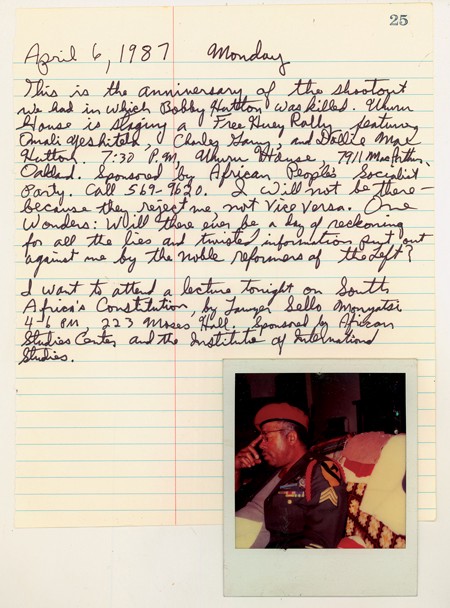
After he jumped his $50,000 bail, Cleaver relied on left-leaning countries and individuals to aid him. For seven years, he and wife Kathleen sought refuge first in Havana, and finally in France. Their son, Maceo, was born in Algeria, and daughter, Joju Younghi, in North Korea.
The Cleavers housed American psychologist Timothy Leary after the Weather Underground helped him escape from prison, but the two soon fell out. Cleaver placed Leary under “revolutionary arrest” after he continued to advocate for the use of psychedelic drugs.
Cleaver also criticized Huey Newton, the co-founder of the Black Panther Party, who now believed guns were antithetical to greater goals for the black community. Cleaver argued that armed resistance was not an aggressive enough response to COINTELPRO, and urged Newton to adopt a policy of guerilla warfare. His position isolated him from the Black Panther party; Cleaver wrote, “One wonders: Will there ever be a day of reckoning for all the lies and twisted information put out against me by the noble reformers of the left?”
By the 1970s, Cleaver’s ideology dramatically shifted, as did his focus. He tried his hand at fashion design, creating a codpiece, which was basically an exposed jockstrap pant for men. He told Newsweek that “Clothing is an extension of the fig leaf — it put our sex inside our bodies. My pants put sex back where it should be.” They failed to take off, and Cleaver became a born-again Christian.
By 1975, life in exile had lost its appeal. Cleaver surrendered to the FBI and renounced his radical past. Back in America he pled guilty to the shooting and was given parole. He soon became disillusioned with the commercialization of Christianity by Evangelicals, and attempted to launch the Eldridge Cleaver Crusades, a hybrid of Islam and Christianity called “Christlam.” He eventually converted to Mormonism, and regularly lectured at LDS gatherings.
He also spoke at the California Republican State Central Committee meeting on his journey across the political spectrum, and ran for several offices. He lost the Republican Party primary for the Senate seat in 1986, and when he insisted the Berkeley City Council begin its meetings with the Pledge of Allegiance, Mayor Gus Newport told him to “Shut up or we’ll have you removed.” He was arrested for burglary in 1988, and was sent to a drug rehabilitation center. He was arrested two more times for possession of crack cocaine, and, ten years later, died in Pomona Valley Hospital Medical Center on May 1, 1998. The cause of death was not revealed.
Bobby Hutton and Eldridge Cleaver are buried at the Mountain View Cemetery in Altadena, California. DeFremery Park in West Oakland was unofficially named after Hutton, and a memorial event commemorating his life and dedication to black consciousness has been held annually since 1998.
Alexander Auctions is offering for sale a diary entry that Cleaver wrote in 1987, on the nineteenth anniversary of Hutton’s death, and around the time of his divorce from Kathleen. In his own handwriting on the page, Cleaver notes he will not be commemorating Hutton’s death at a Free Huey event at Uhuru House, an indication of his gradual adoption of more conservative values. Huey Newton by then had been free for 17 years; two years later, Newton would be shot to death in Oakland. The Uhuru House however is still open and serving the community.
Alexis Coe is now a writer living in San Francisco, but not long ago, she was a research curator at the New York Public Library. Her work has appeared in the Atlantic, Slate, The Millions, The Hairpin, and other publications. Alexis holds an MA in history. Follow her.
